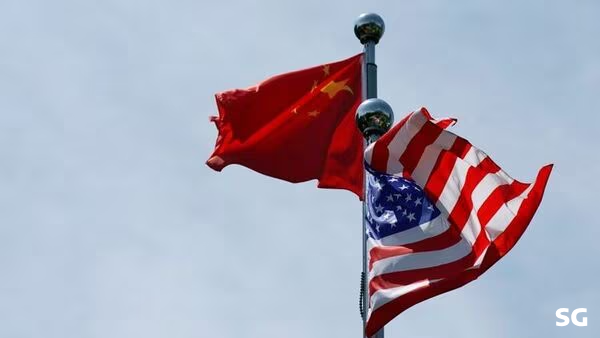Table of Contents

US-China Trade Talks Continue in London Amid Rare Earth Dispute
Negotiations Extend Into Second Day
Trade talks between the United States and China are extending into a second day in London, as senior officials from both nations attempt to ease mounting tensions that have expanded beyond tariffs to include restrictions on rare earth elements. The meetings, held at Lancaster House, a historic UK government venue, were set to resume at 10 a.m. BST on Tuesday.
Temporary Truce Faces Challenges
The current discussions aim to revive a short-lived truce reached earlier in Geneva, which had temporarily calmed financial markets. Since then, U.S. officials have accused China of failing to follow through on its commitments, particularly in the area of rare earth exports.
Trump Signals Optimism Without Details
President Donald Trump described the talks as going well, stating that he was receiving “only good reports” from his team. However, he declined to provide specifics. When questioned about the potential lifting of export controls, he said: “We’re going to see.”
Rare Earths at the Center of the Dispute
U.S. economic adviser Kevin Hassett emphasized that Washington expects China to resume rare earth shipments following a phone call between Trump and Chinese President Xi Jinping. Hassett stated that the U.S. wants a clear commitment, including immediate volume shipments of rare earths, which are critical to high-tech industries.
High-Level Delegations Reflect Stakes
The U.S. delegation includes Treasury Secretary Scott Bessent, Commerce Secretary Howard Lutnick, and Trade Representative Jamieson Greer. China’s team is led by Vice Premier He Lifeng, joined by Commerce Minister Wang Wentao and chief trade negotiator Li Chenggang.
Lutnick’s presence, given his role in overseeing U.S. export controls, underscores the importance of the rare earth issue in these negotiations.
Economic Strains on Both Sides
The trade standoff is already impacting both economies. China’s exports to the U.S. dropped 34.5% in May, marking the steepest year-over-year decline since early 2020. In the U.S., both consumer and business confidence have declined, and first-quarter GDP contracted due to a spike in imports as buyers tried to get ahead of potential cost increases.
While inflation remains stable and job growth continues, many economists expect signs of deeper economic stress to emerge over the summer.
Rare Earth Restrictions Trigger Supply Chain Alarm
China’s April decision to halt exports of various critical minerals and magnets disrupted global supply chains crucial to sectors like automotive manufacturing, aerospace, semiconductors, and defense. U.S. officials are now seeking the reversal of these measures, which they see as retaliatory.
Partial Concessions Expected From Both Sides
Kelly Ann Shaw, a former White House trade adviser, noted that China is likely to offer some concessions, including lifting export restrictions. However, she also stated that the U.S. may only ease newly imposed export controls and not longstanding bans on items like advanced AI chips. In May, the U.S. revoked several export licenses covering semiconductors and aerospace materials.
Legal Battle Over Tariffs Continues
Meanwhile, the legal fight over the legitimacy of Trump-era tariffs advanced as the administration filed an appeal defending the measures. The case, currently before a federal appeals court, could eventually reach the U.S. Supreme Court.
Leaders’ Call Sets Tone for Talks
A recent phone call between Trump and Xi—their first since Trump’s return to office—helped lay the groundwork for the London discussions. During the call, Xi reportedly urged Trump to ease trade restrictions and avoid provocative actions on issues like Taiwan. Trump described the call as positive and said it resulted in an agreement to resume rare earth shipments.
Following the conversation, China granted temporary export licenses to suppliers serving major U.S. automakers.
Cautious Optimism Amid Broader Strategic Divide
Despite the appearance of progress, many observers remain skeptical. Ian Bremmer, president of the Eurasia Group, warned that a long-term resolution remains unlikely due to ongoing strategic decoupling and U.S. pressure on allies to move away from Chinese supply chains.
Bremmer noted that even if a temporary truce is achieved, the broader geopolitical and economic rivalry will continue to define the relationship.
Conclusion: Progress Possible, But Fragile
The outcome of the London talks could have major implications for global trade stability. While both sides appear open to compromise on certain issues, deep-rooted tensions remain. Any agreement reached may prove fragile, and the road to a durable U.S.-China trade relationship remains uncertain.
“US-China Trade Talks Continue in London Amid Rare Earth Dispute” “US-China Trade Talks Continue in London Amid Rare Earth Dispute” “US-China Trade Talks Continue in London Amid Rare Earth Dispute” “US-China Trade Talks Continue in London Amid Rare Earth Dispute” “US-China Trade Talks Continue in London Amid Rare Earth Dispute” “US-China Trade Talks Continue in London Amid Rare Earth Dispute” “US-China Trade Talks Continue in London Amid Rare Earth Dispute” “US-China Trade Talks Continue in London Amid Rare Earth Dispute”